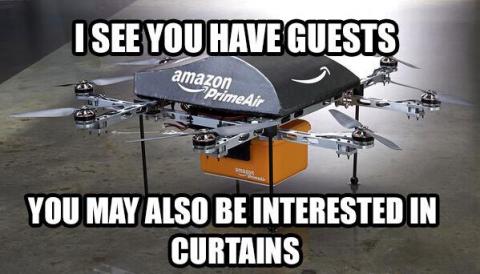Amazon's drone army
Jeff Bezos, founder and CEO of Amazon, seems very cheery in recent interviews. His new business plan has excited not only Bezos, but the speculative corporate press. The new plan is simple, efficient, and oddly alienating: drone delivery.
Some passing lip service has been paid to privacy concerns amid speculation about the regulatory and technology hurdles. The business press has missed and understated the privacy implications. They have not looked carefully at the technological capability of drones. The most important questions in the information age, the ones concerning the flow of data, have yet to be articulated. Seeking answers to those questions gives apparent cause for alarm about Amazon's drone army, or if it really is Amazon's drone army at all.
Amazon's proposed business process is simple. The consumer makes a purchase. If that purchase is small enough in weight, and the consumer is near enough to an Amazon distribution center, a small Octorotor drone delivers the purchase to the consumer's doorstep within a very short time frame. The press has speculated on theft of packages, the ability of these drones to not crash, and the soundness of the business model. They have not taken a closer look at how these drones work.
Amazon's Octorotor drones are neither available for sale to the public, nor are there ready sources of specifications for the product. The Free Press had a good long look at commercially available drones similar to the ones Amazon is developing. We then did some workflow modeling based on experience programing and maintaining the enterprise level information systems for a transhipment warehouse similar in size and volume to an Amazon fulfillment center. The security holes and privacy implications were astounding. When coupled with Amazon's ties to the intelligence community, the implications went from astounding to frightening.
Drones are a growing business worldwide, and there are many companies offering them for sale. I looked at drone systems that would individually cost less to purchase and operate than the salary, benefits and overhead of a single delivery worker. Octorotor drones commercially available that fit this description are very similar to one another. Nearly all can navigate autonomously using GPS from waypoint to way point. Nearly all can also be guided by a human operator. All had video feeds. All could carry a payload of five pounds or more for a twenty mile round trip in an hour or less.
Centering a small fleet of these drones on one of Amazon's fourteen American fulfillment centers makes an interesting scenario. The fulfillment center would have to have a drone control room where an operator or operators could intervene during any action of any drone at any time but still have an overview of all the drones and all the orders. This would require digital video throughput, powerful computers, connection to a high speed network, powerful directional antennae as the drones all seem to communicate in the microwave band and an assortment of screens. Such an enterprise could also double as a powerful metropolitan spy center.
As a customer waits for his or her order, the drone moves from waypoint to waypoint on its journey to deliver the goods. Whether or not a human operator intervenes or watches, its digital video eyes are always on, watching, and probably recording for verification of delivery and loss prevention. Combine dozens of drones with the 24-hour business cycle of online shopping, and the result is vast areas being under constant but random video surveillance.
The limit that such a system would encounter as a surveillance operation is video data storage. Such storage would require cloud computing. Amazon provides cloud computing services to the CIA. It was easier for me to find a job offer at Amazon for a “cloud computing counterintelligence” specialist in Herndon Virginia than it was for me to find the fulfillment center's location in that state.
Being the CIA's provider of cloud services is not the only connection that Jeff Bezos has with the intelligence community. His purchase of the Washington Post this year was negotiated by the private equity firm Allen and Company, who employ former CIA director George Tenet as one of their go to managing directors.
As Amazon deploys their nationwide drone fleet, the cheapest solution to their storage problem is to make it accessible by default to the intelligence community. A FISA court order would not be required to just view the path that a drone took from point A to Point B at a given time. Should an intelligence service wish to take a peek into your backyard, they need only pick a delivery point that would require a drone overflight, and a book they wanted to read, and then click on add to cart.

